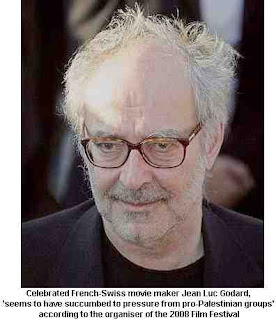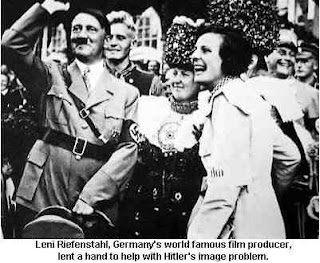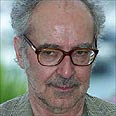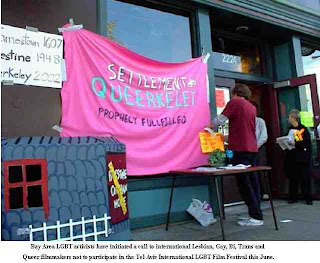Thus the Israeli artistic establishment, with notable exceptions of course, are participants in the Occupation. They intend to lend a hand to repair Israel’s image. Indeed in some ways they are more complicit than the soldiers who beat and shoot because they are helping ensure that the beatings and shootings can continue by presenting an anaesthetised version of an ‘alternative’ Israel of trendy films.
Just as Hitler employed the talents of Leni Riefenstahl to sanitise his regime, so Israel’s film producers and international ones too, lend a hand to portray the breaking of bones and the use of fleschettes in a different light.
Our message to film producers internationally is a simple one.
Stay Away and Don’t Lend a Helping Hand to Apartheid
 |
|
The Palestinian Campaign for the Academic and Cultural Boycott of Israel (PACBI) and the Palestinian Students‘ Campaign for the Academic Boycott of Israel (PSCABI) call on students, lecturers and film-makers to boycott the 13th International Student Film Festival, scheduled for June 2010 in the city of Tel Aviv. PACBI and PSCABI believe that this festival, as with similar cultural initiatives supported by the Israeli government, is openly designed to whitewash the crimes of Israeli apartheid. Festival organizers have highlighted the aim of the festival, noting that it is “a unique cultural and social means to presenting a different Israel to the world, [an] Israel which supports and invests in pluralism, culture and equal opportunity.”[i] This language reveals – as did similar endeavors by the South African Apartheid regime – a cynical and systematic attempt at manipulating world opinion. It aims to obfuscate the real nature of Israeli military occupation and apartheid, and to divert attention from its ongoing war crimes by portraying Israel as a vibrant, cultural and artistic hub. It is for this reason that the festival is heavily funded and supported by the Israeli government. In 2009, this policy of using culture to whitewash Israeli violations of international law was openly confirmed by the Israeli government with the launch of a global ‘Brand Israel’ campaign. According to an Israeli Foreign Ministry spokesperson, the objective of this rebranding campaign, which “could include organizing film festivals” is to convey the message that “a better image for Israel and a better performance of that image is part and parcel [of] Israel‘s national security. Contrary to popular belief, national security is not just based on military power, it‘s also a strong economy and a strong image.”[ii] This attempt to create a ‘better image for Israel’ through film, dance, music and literary events is all the more horrendous given the bloody military assault conducted in 2009 against the occupied Gaza Strip which left over 1,440 Palestinians dead, of whom 431 were children, and 5380 injured. The 1.5 million Palestinians in the besieged Gaza Strip, the overwhelming majority of whom are refugees who were expelled from their homes by Zionist forces in 1948, were subjected to three weeks of relentless Israeli state terror, whereby Israeli warplanes systematically targeted civilian areas, reducing whole neighborhoods and vital civilian infrastructure to rubble and partially destroying Gaza’s leading university and scores of schools, including several run by the UN, where civilians were taking shelter. A UN Fact Finding Mission headed by the prominent South African judge, Richard Goldstone, accused Israel of deliberately and indiscriminately targeting civilians and civilian infrastructure and committing war crimes in this war of aggression. The orders for this assault came from Tel Aviv, a place the festival organizers hope to honour as “the city that never sleeps – an even more turbulent, energetic and lively place. Could we ask for a warmer home for a Festival dedicated to young artists, to young art?”[iii] Moreover, this offensive hubris ignores the fact that the city itself is built on the remains of the homes of Palestinian refugees expelled in 1948, and to which any Palestinian ‘young artist’ from Gaza or the West Bank, let alone from the large Palestinian refugee community in exile, is barred from visiting. Today, the siege on Gaza continues, and the festival organizers are apparently oblivious to these war crimes – preferring to pretend that a festival supported by the Israeli government can “bridg[e] cultural gaps and develop tolerance through cinema”.[iv] It should be noted that in the lead up to the previous Tel Aviv festival in 2008, the renowned French film-maker Jean-Luc Godard canceled his participation following PACBI’s request to boycott the event.[v] He had been due to participate as an honorary guest and to hold master classes with Israeli film students.[vi] Because of the Festival’s open ties with the Israeli state, and its clear aim to normalize Israeli apartheid and whitewash Israel‘s persistent violations of international law and human rights in the minds of filmmakers, students and other cultural workers, PACBI and PSCABI view any participation in this event as a form of immoral complicity and call for a its complete boycott. We urge filmmakers, lectures and students to heed the Palestinian civil society call for a boycott of Israel and its complicit institutions, as they did in the struggle against apartheid in South Africa. This is the bare minimal form of solidarity that we expect from any people of conscience around the world to support our struggle for freedom, justice and a meaningful peace in our region. See article in Yediot Aharanot of 6.1.08. of Jean Luc Godard’s decision to pull out of the 2008 Tel Aviv Student Film Festival. |



